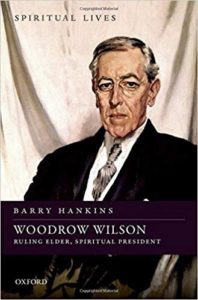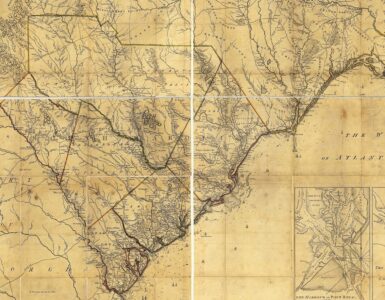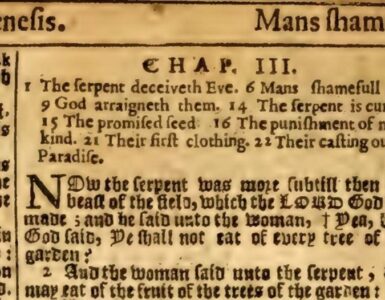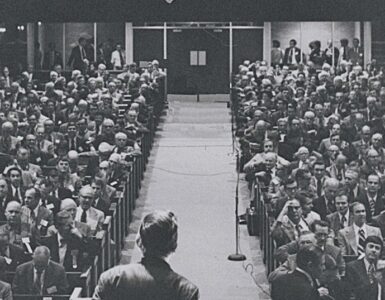 Published in 2016 by Oxford University Press, Barry Hankins’s book in the Spiritual Lives series, Woodrow Wilson: Ruling Elder, Spiritual President, provides a perspective on the life and Christian commitment of the twenty-eighth president of the United States. One element influencing him was Presbyterianism. His mother, Janet (Woodrow) Wilson, was the sister of a Presbyterian minister named James Woodrow who was dismissed from Columbia Theological Seminary’s faculty for teaching evolution; their father, Thomas Woodrow, was an immigrant minister from Great Britain that entered the Old School Presbyterian Church in his new homeland. Woodrow Wilson’s father, Joseph Ruggles Wilson, was also an Old School minister and he pastored churches and taught in theological seminaries. Woodrow Wilson attended Davidson College, a Presbyterian institution, with the intention of entering the ministry, but when his vocational direction changed, he completed studies at Princeton University. When Wilson married Ellen Louise, the daughter of Rebecca and Rev. I. S. K. (Isaac Stockton Keith) Axson, their household had rule-by-elders ancestry on both sides because her father served Independent Presbyterian Church in Savannah. Woodrow and Ellen were married in the manse of her father’s church. So, there is no doubt that Wilson grew up in an environment of Presbyterianism, but the atmosphere included both a conservative interpretation of the Westminster Standards and the views of Uncle James Woodrow regarding science. The Wilson and Woodrow households maintained close relationships. Professor Hankins credits Wilson’s tenure as president of Princeton University with clearing the vestiges of Presbyterianism from campus in order to provide a non-sectarian but generically Christian moral education. The author observes that Wilson believed Christianity provided an idealized moral culture, the best ethical system for the world, especially when connected with democracy. For Wilson, Christianity was ethical, the best tool for progressivist and pacifist improvement of mankind. President Wilson is a perplexing figure to me because the conditions were right for him to be raised on the Bible and the Westminster Standards, which clearly teach the fall, sin, and the need for redemption through Christ, but his thought and practices show presuppositions that suppress or deny the effects of the fall and the need for salvation. I wonder if his thinking was transformed by Davidson and Princeton, or, was his theology-philosophy formed with the help of influences from his mother’s side of the family? James Woodrow in 1902 delivered his sermon as retiring moderator titled, “One Lord, One Faith, One Baptism,” to the Synod of South Carolina meeting, and it appealed for a more encompassing and less confessional definition of Christianity. Did Uncle James and/or his mother provide the seed for what Wilson became? For those interested in learning about President Wilson, Barry Hankins’s book provides an in depth perspective on his Christianity which is a subject the excellent books by A. Scott Berg and H. W. Brands mention briefly. Wilson’s concept of Christianity defined, for better or for worse, who he was.
Published in 2016 by Oxford University Press, Barry Hankins’s book in the Spiritual Lives series, Woodrow Wilson: Ruling Elder, Spiritual President, provides a perspective on the life and Christian commitment of the twenty-eighth president of the United States. One element influencing him was Presbyterianism. His mother, Janet (Woodrow) Wilson, was the sister of a Presbyterian minister named James Woodrow who was dismissed from Columbia Theological Seminary’s faculty for teaching evolution; their father, Thomas Woodrow, was an immigrant minister from Great Britain that entered the Old School Presbyterian Church in his new homeland. Woodrow Wilson’s father, Joseph Ruggles Wilson, was also an Old School minister and he pastored churches and taught in theological seminaries. Woodrow Wilson attended Davidson College, a Presbyterian institution, with the intention of entering the ministry, but when his vocational direction changed, he completed studies at Princeton University. When Wilson married Ellen Louise, the daughter of Rebecca and Rev. I. S. K. (Isaac Stockton Keith) Axson, their household had rule-by-elders ancestry on both sides because her father served Independent Presbyterian Church in Savannah. Woodrow and Ellen were married in the manse of her father’s church. So, there is no doubt that Wilson grew up in an environment of Presbyterianism, but the atmosphere included both a conservative interpretation of the Westminster Standards and the views of Uncle James Woodrow regarding science. The Wilson and Woodrow households maintained close relationships. Professor Hankins credits Wilson’s tenure as president of Princeton University with clearing the vestiges of Presbyterianism from campus in order to provide a non-sectarian but generically Christian moral education. The author observes that Wilson believed Christianity provided an idealized moral culture, the best ethical system for the world, especially when connected with democracy. For Wilson, Christianity was ethical, the best tool for progressivist and pacifist improvement of mankind. President Wilson is a perplexing figure to me because the conditions were right for him to be raised on the Bible and the Westminster Standards, which clearly teach the fall, sin, and the need for redemption through Christ, but his thought and practices show presuppositions that suppress or deny the effects of the fall and the need for salvation. I wonder if his thinking was transformed by Davidson and Princeton, or, was his theology-philosophy formed with the help of influences from his mother’s side of the family? James Woodrow in 1902 delivered his sermon as retiring moderator titled, “One Lord, One Faith, One Baptism,” to the Synod of South Carolina meeting, and it appealed for a more encompassing and less confessional definition of Christianity. Did Uncle James and/or his mother provide the seed for what Wilson became? For those interested in learning about President Wilson, Barry Hankins’s book provides an in depth perspective on his Christianity which is a subject the excellent books by A. Scott Berg and H. W. Brands mention briefly. Wilson’s concept of Christianity defined, for better or for worse, who he was.
Barry Waugh
Another biography from Oxford’s Spiritual Lives series reviewed on Presbyterians of the Past, is by D.G. Hart and titled, Benjamin Franklin, Cultural Protestant, 2021.
Notes–The header image is from Pixabay and was located using the search “bookshelf”. I was made aware of the book by Danny Olinger’s informative review article in the OPC magazine, New Horizons, Oct. 2018.





